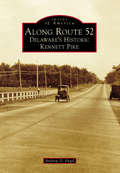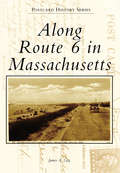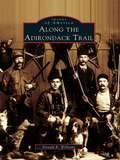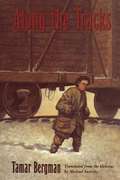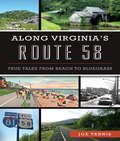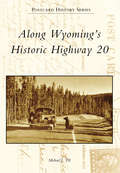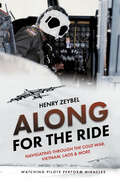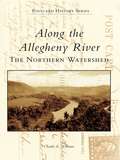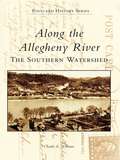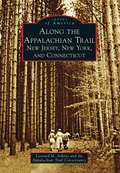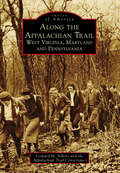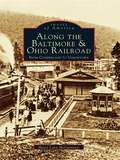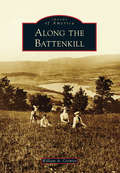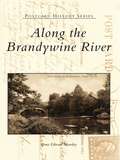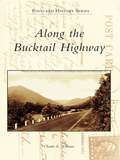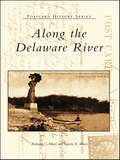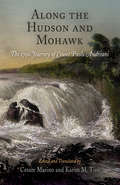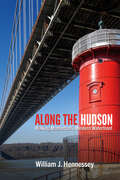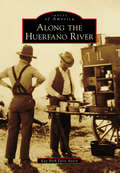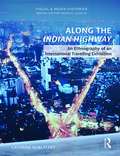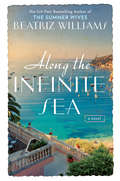- Table View
- List View
Along Route 52: Delaware's Historic Kennett Pike (Images of America)
by Andrew D. EngelCreated through an act of the Delaware Legislature in 1811, the Wilmington and Kennett Turnpike would become one of the most important roads in New Castle County. Linking the city of Wilmington, Delaware, to Kennett Square, Pennsylvania, it would become crucial in the transportation of goods from a growing industrial Wilmington to Philadelphia and the eastern counties of Pennsylvania. Kennett Pike, as it would come to be known, operated as a toll road until it was purchased in 1919 by industrialist Pierre S. du Pont (1870-1954). Du Pont would work over the next year and a half to widen and modernize the highway and eliminate its tolls. When work was completed, he sold the road back to the state for just $1. Kennett Pike has continued to grow through the 20th century, with dozens of private estates gracing its borders. Villages such as Greenville and Centreville have been characterized by their country charm and local businesses, including Shields Lumber & Coal and Buckley's Tavern.
Along Route 6 in Massachusetts (Postcard History Series)
by James A. GayRoute 6 in Massachusetts runs from Provincetown to Seekonk and passes through some of the most beautiful scenery in the state. What had once been a mere footpath for Native Americans, then widened for the use of stagecoaches, Route 6 would be officially designated the “King’s Highway” in 1920. The moniker was extremely unpopular with the local residents, so much so that the governor officially changed the name to the Grand Army of the Republic Highway in 1937. Depicted from the author’s personal collection of postcards from the 1920s to the 1960s, Route 6 winds its way around tiny fishing villages, sand dunes, marshes, beaches, lighthouses, campgrounds, hotels, restaurants, and historic cities. The combination of Route 6 and the automobile would make Cape Cod a world-renowned tourist destination.
Along The Adirondack Trail
by Donald R. WilliamsNative Americans called the area Couxsaxrage, "beaver hunting ground." Professor Ebenezer Emmons named it Adirondack, after one of the native tribes. Along the Adirondack Trail traces the history and lore of the Adirondacks up the scenic roadway through the heart of New York's mountain-and-lake country. Included are tales of the Mohawk Indians and their beatified princess, Tekakwitha; the site of the mansion of Sir William Johnson, one of America's most influential citizens of the 1700s; and an important battleground of the Revolution. Rare original photographs portray each of the twenty settlements on the trail from Fonda to Malone, reflecting the lives of the guides, loggers, trappers, sportsmen, camp owners, tourists, leather workers, and health seekers who opened up the unknown county.
Along The Tracks
by Michael Swirsky Tamar BergmanBased on a true story, Along the Tracks tells the tale of Yankele, a Polish boy who is separated from his mother during the German invasion of Poland in World War II.
Along Virginia’s Route 58: True Tales From Beach to Bluegrass (History And Guide Ser.)
by Joe TennisRoute 58 stretches across all five hundred miles of Virginia, from the sandy shores of the Atlantic to the waterfalls and wild ponies of the Blue Ridge Highlands. Weird, quirky and intriguing legends and lore lie along this historic highway, including a UFO landing in South Hill, Virginia Beach's "witch duck" controversy of 1706 and Nat Turner's bloody insurrection in 1831. Country music icon Johnny Cash played his final shows at the world-famous Carter Fold. Civil War skirmishes touched towns. The "Wreck of the Old 97" happened in Danville, and haunting memories of a schoolhouse lost to a tornado remain in Rye Cove. Author Joe Tennis provides a guide to Route 58 with a trail of tales, accompanied by easy driving directions and vivid photography.
Along Wyoming's Historic Highway 20 (Postcard History)
by Michael J. TillHighway 20 was designated a federal highway in 1926, and until the arrival of the Interstate Highway System in the 1950s it was a primary route across northern Wyoming. From the Great Plains in the east to the mountains in the west, Highway 20 passed though cities and towns that retain their frontier visages and such wonders as Hell's Half Acre, the Wind River Canyon, Natural Hot Springs, Buffalo Bill Scenic Byway, and spectacular Yellowstone National Park. Fortunately, historic Highway 20 remains almost completely intact and can be driven much as travelers did in years past. Postcard History Series: Along Wyoming's Historic Highway 20 celebrates this trip, illustrated by more than 200 vintage postcards showing the personality of the road. Not to be forgotten are the tourist courts, hotels, diners, and gas stations that made automobile travel possible.
Along a River
by Jan NoelFrench-Canadian explorers, traders, and soldiers feature prominently in this country's storytelling, but little has been written about their female counterparts. In Along a River, award-winning historian Jan Noel shines a light on the lives of remarkable French-Canadian women -- immigrant brides, nuns, tradeswomen, farmers, governors' wives, and even smugglers -- during the period between the settlement of the St. Lawrence Lowlands and the Victorian era.Along a River builds the case that inside the cabins that stretched for miles along the shoreline, most early French-Canadian women retained old fashioned forms of economic production and customary rights over land ownership. Noel demonstrates how this continued even as the world changed around them by comparing their lives to those of their contemporaries in France, England, and New England.Exploring how the daughters and granddaughters of the filles du roi adapted to their terrain, turned their hands to trade, and even acquired surprising influence at the French court, Along a River is an innovative and engagingly written history.
Along for the Ride: Navigating Through the Cold War, Vietnam, Laos & More
by Henry ZeybelDuring Hank Zeybel's first tour in Vietnam he flew 772 C130 sorties as a navigator. He volunteered for a second tour, requesting assignment to B26s so he could "shoot back." When B26s were removed from the inventory, he accepted a Spectre gunship crew slot, flying truck-busting missions over the Ho Chi Minh Trail. He describes the terror of flying through heavy AA fire over the trail, and the heroics of the pilots in bringing their crews through. Away from the war he recalls leave back in the US, his elderly father bewildered by his war-hardened attitude and black sense of humor. Contextualizing his time with Spectre gunships, he compares his experiences with those of other airmen, like Phil Combies and Robin Olds, and his broader Air Force career—he joined upon graduating university in 1955 and his first operational assignment was as a B47 Stratojet navigator-bomber at Strategic Air Command—trained to drop thermonuclear bombs with precision. From 1957 to 1963, he logged over two thousand hours as a radar-bombardier in B47 Stratojets and B52 C-models. In this memoir of Vietnam, his Air Force career, and his second career as a journalist and writer, Zeybel's admiration of the skill and bravery of pilots—many of whom who he depended on for his very survival—shines through his descriptions of combat missions and being "along for the ride."
Along the 21st Century Silk Road
by Jeanette LeardiIt was a 7,000-mile overland route heavily traveled by merchants, soldiers, and religious pilgrims during centuries past. Its name derives from the precious commodity carried along its network of paths and roads. Today, a project is under way to replace it with a highway system. What will a 21st-Century Silk Road mean to the people who live there now? Read this book to find out.
Along the Allegheny River: The Northern Watershed
by Charles E. WilliamsThe Allegheny River, of western Pennsylvania and New York, flows through a region rich in natural resources and human history. While the river is 320 miles long, the northern watershed district originates in Potter County, Pennsylvania, and joins the Clarion River near Parker, Pennsylvania. Along the Allegheny River: The NorthernWatershed showcases over 200 vintage postcards of the river, its landscape, and its people. These captivating images chronicle over 200 years of history, from the French and Indian War to the timber and oil booms of the late 19th and early 20th centuries.
Along the Allegheny River: The Southern Watershed
by Charles E. WilliamsThe Allegheny River of western Pennsylvania and New York rises in Potter County, Pennsylvania, and flows 320 miles to its confluence with the Monongahela River in Pittsburgh. The Allegheny's southern watershed district begins in East Brady, Pennsylvania, and ends in Pittsburgh, and it includes the historic Redbank Creek, Mahoning Creek, Crooked Creek, and Kiskiminetas River valleys. Along the Allegheny River: The Southern Watershed features over 200 vintage postcards of the landscapes, people, industries, and events that shaped the history of the southern Allegheny River Valley and of the nation. These absorbing images chronicle over 200 years of history from the frontier wars of the 18th century to the rise and growth ofthe Industrial Revolution in the late 19th and early 20th centuries.
Along the Appalachian Trail: New Jersey, New York and Connecticut
by Leonard M. Adkins Appalachian Trail ConservancyCrossing through 14 states from Maine to Georgia, the Appalachian Trail enters New Jersey through the Delaware Water Gap, crosses New York's Hudson River, and rises over Connecticut's Lion's Head. The area is considered by some to be the pathway's birthplace, for in 1923, just two years after Benton MacKaye originally proposed the trail, the first few miles specifically constructed for the Appalachian Trail were built by volunteers in New York's Harriman and Bear Mountain State Parks. These photographs and the corresponding narrative present a historical perspective on what it took to create the trail, including the thousands of volunteers and the arduous tasks they performed, those who lived along the trail before and during its creation, the many people who have enjoyed the trail through the years, and the original routes that are no longer part of the present-day Appalachian Trail.
Along the Appalachian Trail: West Virginia, Maryland, and Pennsylvania
by Leonard M. Adkins Appalachian Trail ConservancyUnlike counterparts on other sections of the 2,180-plus-mile Appalachian Trail who could locate the pathway within national parks and forests, builders of the 270 miles of trail detailed in Along the Appalachian Trail: West Virginia, Maryland, and Pennsylvania did not have vast tracts of federal lands on which to construct the footpath. Yet they succeeded in creating a trail within many of the states' scenic areas. Hundreds of vintage photographs--provided by the Appalachian Trail Conservancy, National Park Service, state archives, and local trail-maintaining clubs--present an illustrated narrative of the Herculean work and dedication it took for volunteers to plan, build, and continue to maintain the trail in these states. Included are the glimpses of American history the trail passes by, the pathway's early (and later) supporters and hikers, and original locations that have been rerouted off of today's trail.
Along the Baltimore & Ohio Railroad: From Cumberland to Uniontown (Images of America)
by Marci Lynn McguinnessDuring the turn of the century, the railroad was anextremely important transportation and shipping resource to thousands of people and businesses inPennsylvania. Along the Baltimore & Ohio Railroad:From Cumberland to Uniontown dedicates its pages to this mass transportation provider. This book includes images from every B&O bridge and station from Cumberland, Maryland, to Uniontown, Pennsylvania, in 1891. Many of the towns stretched along the miles of tracks, such as Somerfield and Ohiopyle, are depicted in these vintage photographs. Experience the coal and coke booms of the 1880s to 1920s through people from many different locations who had one thing in common: the railroad.
Along the Battenkill (Images of America)
by William A. CormierThe Battenkill Valley, in the southern part of Washington County, is the historical backdrop to many homesteading settlers as well as the Mohawk and Mahican tribes. Two retired Roger's Rangers, James Turner and Joshua Conkey, came to Salem and purchased 25,000 acres of land--known as the Turner Patent--bringing many families from Pelham, Massachusetts, to settle along White Creek and the Battenkill. With the advent of photography, the results of this pioneering spirit were captured, first on glass negative plates and later with roll film, by numerous Salem photographers from 1865 to the early 1900s. As new canals, roads, and railroads of the 1800s were built, local photographers could travel easily with their heavy photography equipment, capturing scenes of the towns and villages nestled in the Adirondack Mountains, replete with their own rivers and lakes. Now, the region thrives off agriculture, logging, mining, and tourism. The Battenkill draws hundreds of fishermen, boaters, and swimmers to the area in the spring and summer.
Along the Brandywine River
by Bruce Edward MowdayThis fascinating new history of the historical river that winds through Chester County, Pennsylvania, and the upper regions of Delaware and emptying into the Christina River in Wilmington, Delaware, showcases more than two hundred of the best vintage postcards available. The collected postcards show the countryside as it appeared during the Revolutionary War Battle at Brandywine through the time of nineteenth-century settlements in the region and into the twentieth century.
Along the Bucktail Highway
by Charles E. WilliamsThe Bucktail Highway, Pennsylvania Route 120, traverses over 100 miles of the commonwealth's historic northern tier, linking Ridgway in the west with Lock Haven in the east. The Bucktail Highway crosses the eastern continental divide east of St. Marys and closely follows the picturesque, deep valleys carved by Sinnemahoning Creek and the West Branch of the Susquehanna River. Originally a Native American path and later a road that carried settlers west beyond the Allegheny Front, today's Bucktail Highway is a centerpiece of the Pennsylvania Wilds, a public-private initiative to promote and conserve the unique natural and historic resources of the region. Along the Bucktail Highway showcases over 200 vintage postcards profiling the cultural and natural history of the towns, forests, and waters linked by this scenic route from its beginnings as a westward trail, its growth as a commercial and industrial corridor in the late 1800s and early 1900s, and its recent emergence as a premier Pennsylvania scenic byway.
Along the Delaware River
by Richard C. Albert Carrie E. AlbertThe Delaware River has been home to steamboats and canoes, swimmers and fishermen, and shipyards and factories for generations. Recreation and industry have long coexisted along its changing banks. Along the Delaware River presents the Delaware River corridor-from Hancock, New York, in the Catskill Mountains, to the mouth of the Delaware Bay-at the beginning of the twentieth century. Postcards, many nearly a hundred years old, are used to show a river system that both resembles and differs greatly from the one we know today.
Along the Endless River: A compelling and heartbreaking historical novel
by Rose AlexanderIn the heart of the rainforest, Katharine will fight for her life and for love1890: When Katharine and her husband, Anselmo, set sail to Brazil to reap the spoils of the rubber boom, it seems as if they cannot fail. But when Anselmo dies suddenly on the treacherous waters of the Amazon, a pregnant Katharine must decide whether or not to continue her husband’s dream, alone. And when new love appears on the horizon, she must determine if she's brave enough to risk her heart again...Meanwhile her sister Mabel is struggling to support their family back in London. Navigating new worlds in the upper class, she discovers that life as a housemaid has its own dangers, and Mabel soon learns that the whims of men can prove deadly…Mabel and Katharine must both fight for their futures if they are ever to be reunited. Can they find love and happiness along the way?A stunning saga of love, betrayal, secrets and family for fans of Dinah Jefferies, Erica Brown and Renita D'Silva.
Along the Hudson and Mohawk
by Karim M. Tiro Cesare MarinoIn the summer of 1790 the Italian explorer Count Paolo Andreani embarked on a journey that would take him through New York State and eastern Iroquoia. Traveling along the Hudson and Mohawk Rivers, Andreani kept a meticulous record of his observations and experiences in the New World. Published complete for the first time in English, the diary is of major importance to those interested in life after the American Revolution, political affairs in the New Republic, and Native American peoples.Through Andreani's writings, we glimpse a world in cultural, economic, and political transition. An active participant in Enlightenment science, Andreani provides detailed observations of the landscape and natural history of his route. He also documents the manners and customs of the Iroquois, Shakers, and German, Dutch, and Anglo New Yorkers. Andreani was particularly interested in the Oneida and Onondaga Indians he visited, and his description of an Oneida lacrosse match accompanies the earliest known depiction of a lacrosse stick. Andreani's American letters, included here, relate his sometimes difficult but always revealing personal relationships with Washington, Jefferson, and Adams.Prefaced by an illuminating historical and biographical introduction, Along the Hudson and Mohawk is a fascinating look at the New Republic as seen through the eyes of an observant and curious explorer.
Along the Hudson: Walking Manhattan’s Western Waterfront (Excelsior Editions)
by William J. HennesseyTakes you on eight fascinating walks along Manhattan's Hudson waterfront, with stops along the way to explore its architecture, infrastructure, and history.Through eight structured walks from Battery Park to Spuyten Duyvil, Along the Hudson tells the story of the rise, decline, and rebirth of Manhattan's Hudson waterfront from the seventeenth century to the present day. It traces the ongoing evolution of the Hudson shoreline from a gritty line of working docks into a desirable residential enclave and a chain of inviting parks. Along the way special attention is paid to notable buildings both historical and contemporary, to key transportation infrastructure, and to seminal historic events and personalities that shaped New York's dynamic relationship with the river that is its reason for being. Some of the many sites readers will explore include:At the foot of Pearl Street, the Wireless Operators Memorial (1915) honors radio operators who died at sea. Jack Phillips, radio man on the Titanic, is the first name listed.Westbeth, a five-building complex filling the entire square block along West Street between Bank and Bethune Streets. Once home to Bell Labs, the site was converted to provide housing and workspace for artists, writers, and performers.Anna Hyatt Huntington's statue of Joan of Arc at 96th Street honors the French saint. Its gothic pedestal contains stones from the jail cell where Joan was imprisoned. Depicting a female hero sculpted by a female artist, this monument inspired many copies erected across the country.Next to the George Washington Bridge, at 178th Street, stands Jeffrey's Hook Lighthouse, which inspired a children's book entitled The Little Red Lighthouse and the Great Gray Bridge.
Along the Huerfano River (Images of America)
by Kay Beth AveryLong before English speakers set eyes upon it, the volcanic plug on the south bank of the Huerfano River was tagged with a moniker that means "the orphan." Spanish conquistadors saw it as a rock pile that God dumped in the middle of nowhere, an odd little cone far removed from the regular foothills edging the Sangre de Cristo Mountain Range. In the 18th century, this outcropping and the river that bears the same name were famous landmarks for Native American tribes, Hispanic explorers, and French adventurers. Then in the 19th century, along came US mountain men, gold-seekers, cowboys, sheep ranchers, railroad workers, town developers, and coal miners from 31 different countries, speaking 27 different languages. Counterculture revolutionaries discovered the area in the 1960s and established five separate communes west of Walsenburg. Each wave of immigrants brought new perspectives and lifestyles.
Along the Inca Road: A Woman’s Journey into an Ancient Empire
by Karin MullerMuller shares her seven-month adventure along the treacherous, starkly beautiful expanse of this ancient route. Along the way, she tries her hand at bull-fighting, paddles a reed boat, and accompanies the Ecuadorian military on a de-mining patrol.
Along the Indian Highway: An Ethnography of an International Travelling Exhibition (Visual and Media Histories)
by Cathrine BublatzkyThis book is an ethnographic study of the travelling art exhibition Indian Highway that presented Indian contemporary art in Europe and China between 2008 and 2012, a significant period for the art world that saw the rise and fall of the national exhibition format. It analyses art exhibition as a mobile "object" and promotes the idea of art as a transcultural product by using participant observation, in-depth interviews, and multi-media studies as research method. This work encompasses voices of curators, artists, audiences, and art critics spread over different cities, sites, and art institutions to bridge the distance between Europe and India based on vignettes along the Indian Highway. The discussion in the book focuses on power relations, the contested politics of representation, and dissonances and processes of negotiation in the field of global art. It also argues for rethinking analytical categories in anthropology to identify the social role of contemporary art practices in different cultural contexts and also examines urban art and the way national or cultural values are reinterpreted in response to ideas of difference and pluralism. Rich in empirical data, this book will be useful to scholars and researchers of modern and contemporary art, Indian art, art and visual culture, anthropology, art history, mobility, and transcultural studies.
Along the Infinite Sea
by Beatriz WilliamsEach of the three Schuyler sisters has her own world-class problems, but in the autumn of 1966, Pepper Schuyler's problems are in a class of their own. When Pepper fixes up a beautiful and rare vintage Mercedes and sells it at auction, she thinks she's finally found a way to take care of herself and the baby she carries, the result of an affair with a married, legendary politician. But the car's new owner turns out to have secrets of her own, and as the glamorous and mysterious Annabelle Dommerich takes pregnant Pepper under her wing, the startling provenance of this car comes to light: a Nazi husband, a Jewish lover, a flight from Europe, and a love so profound it transcends decades. As the many threads of Annabelle's life from World War II stretch out to entangle Pepper in 1960s America, and the father of her unborn baby tracks her down to a remote town in coastal Georgia, the two women must come together to face down the shadows of their complicated pasts. Indomitable heroines, a dazzling world of secrets, champagne at the Paris Ritz, and a sweeping love story for the ages, in New York Times bestselling author Beatriz William's final book about the Schuyler sisters.
